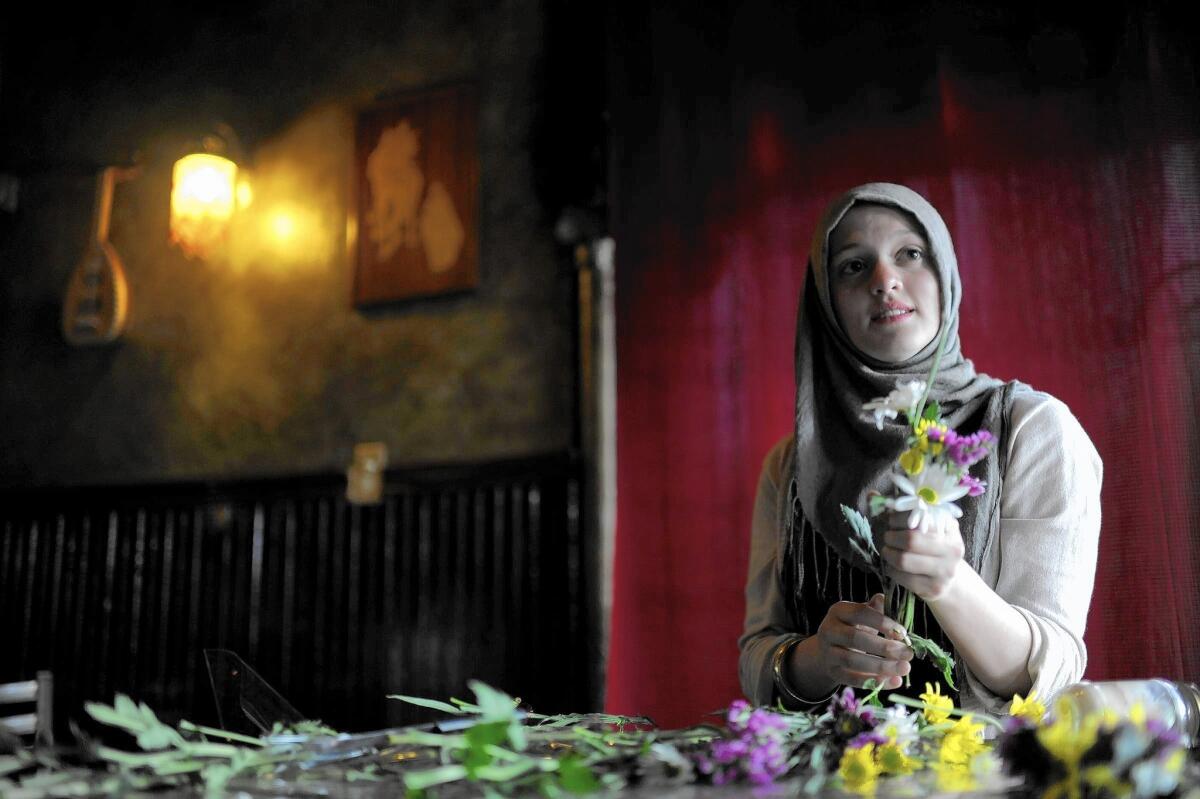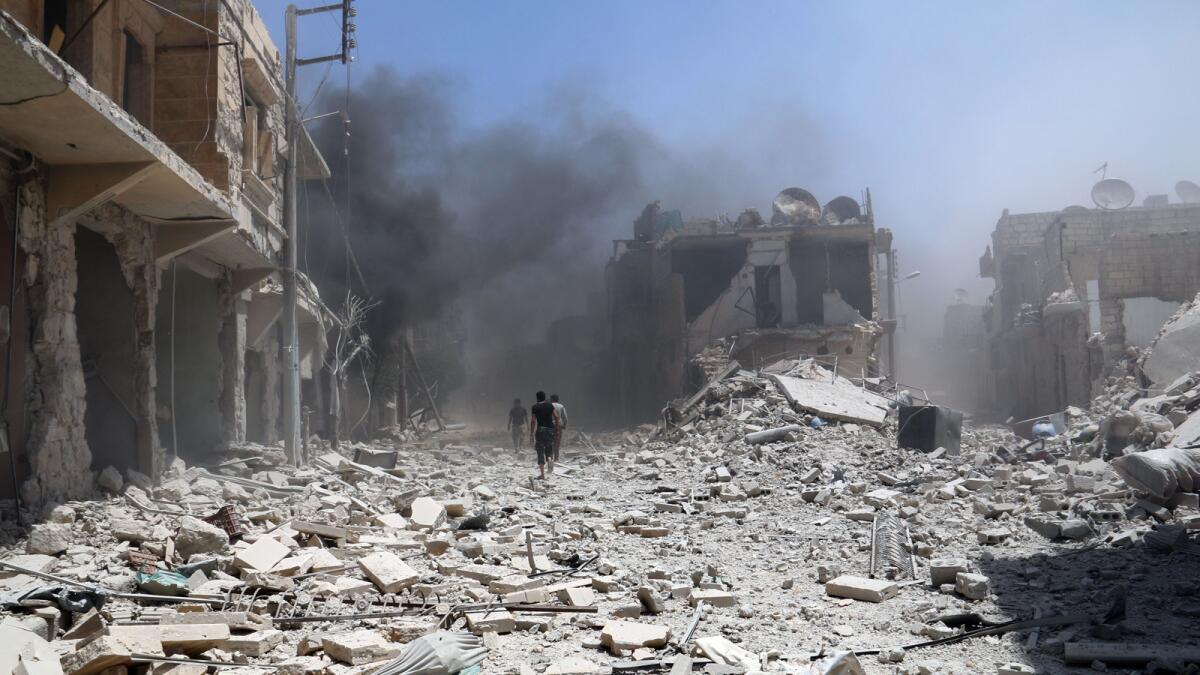Great Read: âPoetry is a witnessâ to suffering wrought by Syriaâs civil war

Waitress Amal Kassir prepares flowers for the tables at Damascus Grill in Littleton, Colo., on April 19, 2012.
The words are bound in blood and speak of graves and broken bones.
The poetry radiating from the Syrian civil war echoes with nostalgia, bombs and betrayals; it slips into the lives of torn-apart families and boys of defiance who have grown into men with bandoleers and Kalashnikovs. It is the verse of the forsaken in a nation of madmen with black flags, cities of ruin and rivers of refugees.
The poems flow in slipstreams of syllables, beats and rhythms composed by writers, doctors, mothers, activists and Syrians who live abroad but are compelled to articulate the suffering in their ancestral land. They are all connected: The old man in a Turkish refugee camp clings to a few pages of his scribbled verse. Syrian American hip-hop artist Omar Offendum riffs through songs of admonition and loss. And Amal Kassir summons the blistered hands and shattered orchard on her grandmotherâs farm.
My grandmother knows Syria better than anyone.
It is the arthritis living in her knees.
She had a farm whose dust she knew by name.
... And the tyrant,
The dirt is waiting for him.
Like the rest of us,
He will learn his grave,
Feel the weight of the entire country on his chest.

SIGN UP for the free Great Reads newsletter >>
A 20-year-old Syrian American college junior, Kassir wrote âMy Grandmotherâs Farmâ while waiting tables at her fatherâs Syrian restaurant in Littleton, Colo. She and her family lived outside Damascus from 2002 to 2005, and these days Kassir travels the world drawing attention to Syria through rallies and slam poetry performances. She carries a book bag and wears a hijab; when she reads, her voice blooms with a girlâs pitch tempered by a womanâs wisdom.
The war has âcaptivated all of my poetry,â said Kassir, who is finalizing a collection of poems titled âScud Missile Blues.â âItâs something profound when you can compare the color of a pomegranate to the color of blood on the ground. There is color and scent and sound involved.â
But years of relentless conflict and human rights abuses have at times silenced her verse. âI had a dry spell with my poetry for nine months,â she said. âI was rooted in depression. I felt the world had betrayed us.â
Since the revolution began in 2011, more than 200,000 people have been killed. More than 4 million refugees have spilled from Syriaâs borders; at least 7.6 million others have been internally displaced. The war has spun into a confusing roulette of air strikes, chemical attacks, rebels, Islamic militants and the designs of the U.S. and Russia over what will befall President Bashar Assad.
She does not cut a tree, does not steal, does not surrender her soul to weariness, does not ask anyoneâs charity, does not fold with the load, and does not yield midway.
— Najat Abdul Samad
âPoetry is a witness,â said Mohja Kahf, an Arab American poet and literature professor at the University of Arkansas. She praised the work of Syrian poets Khawla Dunia, an activist, and Fadwa Suleiman, an actress who led protests against Assad. Kahf said one of Suleimanâs poems felt like âstumbling through the streets of the city in a new language. It was about displacement ... in this bizarre, twisted revolution.â
Dunia became known for her Facebook posts on the plight of women and those who vanished in Syriaâs prisons. She contributed an essay to the book âDiaries of an Unfinished Revolution: Voices From Tunis to Damascus,â in which she wrote, âNo voice can be heard above the gunfire.â Kahf has been translating Duniaâs poems into English, including a draft of one called âSniperâ:
Finger that does not rest
Limb that leans on fate,
a fate ruled by a dumb rifle, and you
Have you known who I am?
Who taught you what you are doing to me?
Who froze you in the blunder of this moment?
This moment which joins us:
your eye,
a bullet,
and me
It is this moment, then,
that unites us.
It divides me from my dream
and gives you your name,
Sniper.

Rubble covers the street after an alleged airstrike by a Syrian army helicopter in the northern city of Aleppo last year.
Syriaâs souks and salons have long echoed with storytellers and poets, including Buhturi in the 9th century and Adonis, regarded as one of the best Arabic poets of the 20th century. Many writers and intellectuals were persecuted during Assadâs regime and the preceding 30-year rule of his father, Hafez. Political discourse â and the inherent poetry that emanates from it â was muffled or disguised in code until the Arab Spring uprisings of 2011 that swept through Tunisia, Egypt, Yemen, Bahrain and Syria.
âWe Syrians had been silenced for a very long time,â said Ghada Alatrash, the daughter of a former Syrian ambassador who lives in Canada and translates poetry from the war zone into English. âBut in new language since the revolution, something powerful was articulated. It captured everyone who was Syrian. I saw a lot of courage. There was nothing to lose.â
One of the most searing voices from inside Syria is Najat Abdul Samad, a doctor from the southern city of Sweida. âWhen I am overcome with weakness, I bandage my heart with womenâs patience in adversities,â she writes in a poem Alatrash translated. It continues:
âI bandage it with the upright posture of a Syrian woman who is not bent by bereavement, poverty, or displacement as she rises from the banquets of death and carries on shepherding lifeâs rituals. She prepares for a creeping, ravenous winter and gathers the heavy firewood branches, stick by stick from the frigid wilderness. She does not cut a tree, does not steal, does not surrender her soul to weariness, does not ask anyoneâs charity, does not fold with the load, and does not yield midway.â
The final line reads: âI bandage it with the outcry: âDeath and not humiliation.ââ
The vigor of the revolutionâs early days, however, has been sapped by years of barrel bombs, quickly dug graves and the feeling of many Syrians that their nation has been cut adrift by the international community and turned into a land of barren fields and proxy wars.
âLonging has become my religion, just as humanity is my religion,â Samad wrote in an email to Alatrash. âToday our country smells of all seven continents, but it remains orphaned.â
The writing has become âlittle glimpses of the real tragedy that are taking place on the Syrian ground,â said Alatrash, who has been asked by some poets not to reveal their names for fear of reprisals. âNow, itâs sons going off to war and not returning. Itâs become more real.â

This brutal tableau is conjured in Offendumâs hip-hop songs. In the early days of the revolution, Offendum, who grew up in Washington, D.C., listening to rappers such as Tupac Shakur and Biggie Smalls, delayed the release of an anti-Assad song until his family members escaped Syria. âI had to hold my tongue for a long time,â he told The Times. âI couldnât release a song like that without their blessing.â
Offendumâs new song, âCrying Shame,â speaks to how intractable and mind-numbing the war has become:
Now they say Syriaâs confusing
Canât decide which of the sides
They really should be choosing
Hereâs a thought:
How âbout you recognize weâre all losing
And thereâs nothing civil about a war
Where kids are stabbed to death and mothers smothered on a kitchen floor.
Millions have fled the shattered Syrian landscape, escaping by boat, foot, car and rail into Lebanon, Jordan and across Turkey to Europe. One refugee wrote: âOn knife blades with swollen feet I walk.â
Kassir visited a refugee camp in Turkey this year, amazed at the rows of tents and the immense scale of those forced into exile.
âThere were no young men, only little kids, women and old, old men,â Kassir said. âOne old man walked into a tent and came out with three pieces of paper.â On them, she said, he had written the meticulous verse of the dispossessed. âThe war,â one line read, âis a monster that has devoured the green.â
Twitter: @JeffreyLAT
MORE GREAT READS:
Russiaâs military clubs for teens: Proud patriotism or echoes of fascism?
Retailers exasperated -- and empathetic -- over number of homeless at Sylmar strip mall
Tethered by a string and trust, a blind sprinter and his guide make history
More to Read
Sign up for Essential California
The most important California stories and recommendations in your inbox every morning.
You may occasionally receive promotional content from the Los Angeles Times.











